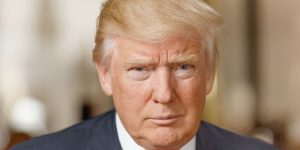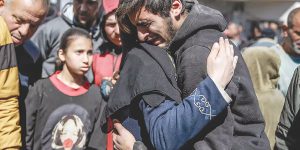
Lisa Romero-Muniz, a New Mexico mother of three worked as a high school secretary. Angela “Angie” Gomez graduated from a California high school two years ago. Sandy Casey taught special education in California. Jessica Klymchuk from Canada had four children and a career as a school librarian. Adrian Murfitt was a commercial salmon fisherman from Alaska. Sonny Melton, a registered nurse worked in a surgical unit in Tennessee. Quinton Robbins was employed as a city recreation assistant in Nevada.
They were among more than 22,000 fans who attended the annual Route 91 Harvest Festival in Las Vegas last weekend. They died there Sunday night.
During the final act of the three-day country music festival, a gunman positioned at a hotel window overlooking the outdoor concert opened fire. He killed at least 59 people and injured at least 527 concertgoers before fatally shooting himself.
The gunman sadistically terminated a happy, carefree event that fans had looked forward to all year. In its place, he viciously staged a deadly, grotesque production. It will haunt survivors, relatives and friends of the dead, and the city of Las Vegas. And many people will forever associate country music with the heinous massacre.
Amid the shock and mourning, there are questions. Is there such a thing as safe space these days? Do we want screening at the nation’s hotels, similar to security measures at our airports, and if that’s what we want, is it feasible?
Investigators found 23 guns in the murderer’s 32nd-floor hotel room – high-powered rifles, including two mounted on tripods and handguns. There were hundreds of rounds of ammunition in various calibers.
High-powered rifles measure around 35 inches long and weigh anywhere from several ounces to several pounds each. Along with the ammunition, they would’ve fit into the shooter’s luggage. According to a Las Vegas sheriff, he had carried to his hotel room at least 10 suitcases since arriving three days earlier. In his car and at one of his two houses, investigators found ammonium nitrate, an ingredient used in explosives, and another 19 firearms, thousands more rounds of ammunition and explosives.
What, if anything could be done to prevent such wholesale attacks? Should hotel guests and their luggage be x-ray screened for firearms and explosives? Such measures are now common in airports, concert venues, government buildings and sports stadiums across the nation.
Would hotel screening be practicable? Would it prevent injuries and death? What would it cost? Would the hotel industry support it? Would it be voluntary or require legislation? Are we ready to sacrifice the current ease and convenience of hotel check-ins? Would what we’d be giving up compensate for what would be gained?
Nota bene: Our thoughts and prayers are with the victims of the Las Vegas massacre and their families.
_______________________________________________________________________________________
Seguridad versus hospitalidad de un hotel
Lisa Romero Muñiz, madre de tres hijos de Nuevo México trabajaba como secretaria de preparatoria. Ángela “Angie” Gómez se graduó de la preparatoria en California hace dos años. Sandy Casey impartía clases de educación especial en California. Jessica Klymchuk de Canadá tenía cuatro hijos y una carrera como bibliotecaria escolar. Adrián Murfit era un pescador comercial de salmón de Alaska. Sonny Melton, una enfermera registrada trabajaba en una unidad quirúrgica en Tennesse. Quinton Robins era empleado como asistente recreativo municipal en Nevada.
Ellos estaban entre los más de 22,000 asistentes al festival anual Route 91 Harvest en las Vegas el pasado fin de semana. Ellos murieron allí el domingo por la noche.
Durante la presentación final del festival de música country de tres días, un pistolero se colocó en una ventana de un hotel mirando el concierto al aire libre y abrió fuego, matando a por lo menos 59 personas y lesionando a por lo menos 527 antes de suicidarse.
El pistolero sádicamente terminó con un evento feliz y tranquilo que el público había estado esperando todo el año. En lugar de eso, agresivamente presentó una producción mortal y grotesca. Esto perseguirá a los sobrevivientes, familiares y amigos de las personas muertas, y a la ciudad de Las Vegas, y mucha gente por siempre relacionará la música country con la horrible masacre.
En medio del shock y del luto, existen preguntas. ¿Existe un lugar seguro en estos días? ¿Queremos revisar los hoteles del país, similar a las medidas de seguridad en nuestros aeropuertos, y si eso es lo que queremos, es posible?
Los investigadores encontraron 23 armas en el cuarto de hotel del asesino en el piso 32, rifles de alto calibre, incluyendo dos trípodes y revólveres . Había cientos de balas de diferentes calibres.
Los rifles de alto poder miden unos 35 pulgadas de largo y pesan desde varias onzas hasta varias libras cada uno. Junto con las balas, hubieran tenido cabida en el equipaje del asesino. De acuerdo con el alguacil de Las Vegas, él habría cargado a su hotel por lo menos diez maletas ya que llegó tres días antes. En su carro y en al menos dos de sus casas, los investigadores encontraron nitrato de amonia, un ingrediente utilizado en explosivos y otras 19 armas, miles más de balas y explosivos.
¿Qué se habría podido hacer para evitar tales ataques en masa? ¿Deberían los huéspedes de hoteles y su equipaje ser examinados bajo rayos X para buscar explosivos y armas? Tales medidas ahora son comunes en aeropuertos, lugares de conciertos, edificios gubernamentales y estadios deportivos por todo el país.
¿Qué tipo de revisión sería práctico? ¿Evitaría lesiones y muertes. Cuánto costaría, apoyaría la industria hotelera?. Sería voluntario o se requeriría de legislación?. ¿Estamos listos para sacrificar la tranquilidad actual y la comodidad para entrar a un hotel?. ¿A qué tendríamos que renunciar para compensar lo que ganamos?
Nota: nuestras oraciones están con las víctimas de la masacre de Las Vegas y sus familias









